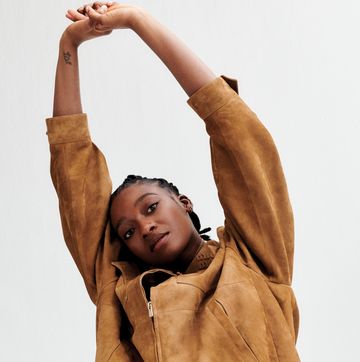The music was still playing at Noni Martins’ wedding reception when guests started bringing up the subject of babies. Still in her white lace, sweetheart neckline gown, the expectation, rooted in her Zimbabwean upbringing, that her role was to be a good wife and have children, was now a reality waiting to be fulfilled.
So, when, Noni, 32, and her husband joined the disproportionately small number of Black British couples undergoing infertility treatment, a year later, she had to unlearn everything her culture had taught her about the path to motherhood.
Noni, a projects and operations manager, from Merseyside, who moved to the UK as a teenager, says: 'The reality is that, as a Black woman, to accept what I now know to be infertility is to have your womanhood invalidated. As an informed millennial I have taught myself that is not the case but the journey to becoming a mother that I was raised on was linear - a good girl gets married and gives her husband a family. Deviations from that are taboo.'
A new report from fertility watchdog, the HFEA, today, shows that Noni is not alone. Black people, in the UK, are over 25 times less likely to access fertility treatment than white people and 7% less likely to be successful, it reveals. Between 2014 and 2018, 5,934 people of Black African heritage and 1,141 Black Caribbean people underwent IVF, in contrast to 189,356 white British patients. Black patients also started treatment two years later than white counterparts, on average, with serious implications for their reproductive health.
The HFEA have called on GPs, fertility experts, government and communities to address the health, socioeconomic and cultural factors that underly the ethnic infertility gap.
Noni, now in her fourth year of trying to get pregnant - she came off contraception a year before her 2018 wedding - says: 'There is no NHS in Zimbabwe; I grew up completely removed from the idea that a doctor could help you to have a baby. As Africans, we talked about fertility but never infertility. I didn’t hear conversations around IVF or adoption. I heard stories about married women being sent back to their families when they couldn’t bear children.'
One in seven couples have difficulty conceiving, yet Noni discovered that she could be referred for treatment, by accident, in April 2019, following a hospital admission for unrelated pelvic pain. When a doctor routinely asked if she could be pregnant and how long she’d been trying, the concern on her face told Noni what she already knew: 'I had spent two-and-half-years in such denial that it kept me from seeking help. I often wonder if I’d ever have done it without that conversation.'
Tests revealed that her husband had a low sperm count, a result of over 10 years on kidney dialysis.
Noni says: 'It never occurred to me that the reason we couldn’t get pregnant was male factor infertility. I had spent years feeling shame and anguish towards my own body because of a false belief, among Black Africans, that infertility issues stem only from the woman. White girls are taught about the power of their voice from a young age but mine was a more patriarchal upbringing. I had to check and unlearn so many things I’d held on to.'
Noni faced a culture of silence and stigma when she began speaking up, both to family and via her blog unfertility.com, where she seeks to demystify the subject and break the silence.
'Culturally, family matters stay within the home. People asked if I had my husband’s permission to speak about our struggle. In my immediate family, the word "taboo" came up many times. That was very hard to hear in response to something so real to me.'
She wells up: 'A cousin told me, "I’m sure your husband still loves you." When another relative got pregnant, no one told me. I questioned why they couldn’t have that conversation with me.'
Inequalities in attitudes and outcomes from infertility are not unique to Black communities. Eight times more white Brits than those of Indian and Pakistani descent, combined, underwent IVF in the four years covered by the HFEA’s report. Similarly, there were only 259 Black egg and sperm donors, combined, compared to over 9,000 white donors, limiting options for people who want their children to reflect their own ethnicity.
HFEA chair, Sally Cheshire, says: 'While we currently do not have definitive explanations for why these differences exist between patients of different ethnicities, it’s crucial that more work is done, and that action is taken to level the playing field for all our patients.'
Noni is currently undergoing her third IVF attempt and remains certain she will, one day, become a mother. But she believes the Black infertility experience must be more visible - on posters and pamphlets in clinics, in communities and families and in the experiences that women like herself are exposed to.
'Infertility is difficult and lonely,' she says. 'As long as these issues stay hidden, the harder it remains to overcome added stigma. When I started blogging, I thought I’d be a lone voice; the connections I have made with other Black women on social media tell me I am not.
'While experts must work to improve our chances of parenthood, we have to reach into our communities and have uncomfortable discussions. These conversations start small but our voices are growing.'
Fertility Network UK provide support for people experiencing infertility, including groups for Black and Asian women.
Like this article? Sign up to our newsletter to get more articles like this delivered straight to your inbox.
In need of more inspiration, thoughtful journalism and at-home beauty tips? Subscribe to ELLE's print magazine today! SUBSCRIBE HERE
















